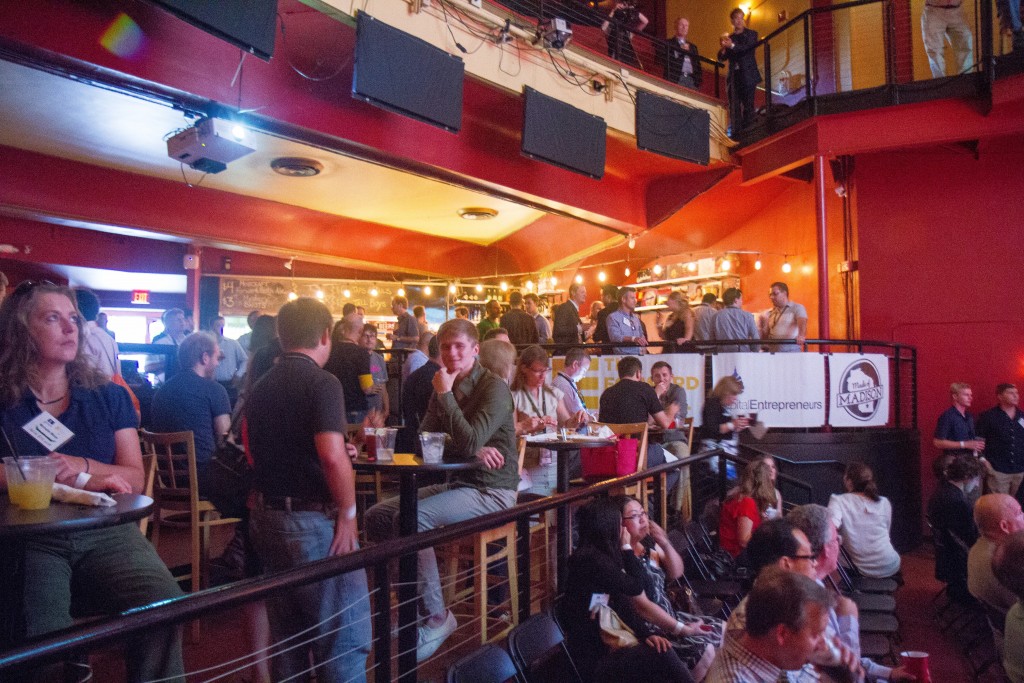
During Forward Fest developers in Madison, WI discussed ways to build the Midwestern city into a major gaming industry hub.
Educational game developers like Filament Games and Games+Learning+Society Studios earn national attention for their award-winning educational games. They take special care to base their games on the latest learning research to ensure they are the best marriage of play and learning. They are also thousands of miles away from the power center of the gaming industry.
During Madison’s annual Forward Fest last week, they and nearly 90 other developers gathered in a concerted effort to do a better job keeping local development talent in the fold instead of losing young developers to the frenzy of San Francisco’s Silicon Valley, Seattle’s ever-expanding Amazon empire or the opportunities offered by the greater New York area.
After ice-breaking over a few pints of local brew, game development CEOs, studio heads and other leadership gathered together to shake unfamiliar hands and brainstorm ways to better organize, brand and access capital for future games.
Constance Steinkuehler, co-director of UW-Madison’s Games+Learning+Society and executive director of the Higher Education Video Game Alliance, said Madison has everything it needs to be major gaming hub.
”We just need some coordination and intentionality behind shaping an ecosystem that will continue to build upon our critical mass and create a density that can compete with the coasts,” Steinkuehler said.
Filament Games CEO Lee Wilson was there and said getting everybody together was an obvious, but necessary, move. He believes his community could do more to advertise the wealth of development opportunities in the area.
“There’s enough studios here that someone can make a career. Yes, we are at that point but only recently. We have to do a better job letting people know that,” he said, adding that those people include members of their own game development community.
“There were very few people who knew more than ten other people in the room. Just getting everybody together to see each other is a concrete outcome,” he said
According to the leaders of the effort, the biggest piece to this puzzle is cultivating a renewable resource of local talent. There is no formal degree program in game design at the University of Wisconsin-Madison, where hungry young developers have the option to major in computer science, but have to wait in line with hundreds of other students to attend the few classes offered by GLS if they want to cut their teeth on game design basics.
It’s unclear if the UW-Madison has plans to offer a game design program in the future, or if the college is even the ideal space for such a program to exist.
“The university is a major component of the puzzle, as a source of talent,” said Wilson, who also looks at local business schools as possible educational collaborators.
Madison’s gaming industry, both commercial and educational, has experienced a bit of a boom recently, with at least 15 start-up gaming companies popping up in the area. But the educational option is not always an easy sell to younger developers who might have grown up with dreams of building and basking in the glow of the next Halo instead of the next Common Core-aligned math game.
Filament Games currently has seven job openings, but Wilson said that’s a product of his company’s growth rather than an absence of talent.
“We have lost a couple folks to the west,” he said, “but it’s more about moving from learning games to commercial games. People who are committed to Filament’s goal stick around. Overall, we have very little turnover. We can find plenty of people who want to be on that mission. We can easily get 100 résumés for a position. But the educational gaming world is working hard to find a business model that works. If you look at, say GlassLab and Amplify, there are starts and stops to finding out what schools are willing to pay for.”
Which is why Michael Gay, a senior vice president with the Madison Region Economic Partnership, wants to help game developers figure out additional ways to court funders that live outside of K-12.
“You’ve got to have something that competes nationally. You got to be a player,” Gay said. “If you’re not a player there’s no sense in investing money. And we’re strategizing right now to make that happen… The goal is to have [developers] get the skills that local companies can use, and that they stay here and help out local companies within the consortium: academia, research and development and private companies big and small.”
According to Gay, any startup looking to make their mark in a crowded app market needs to expand beyond mastering a coding language and learn how to speak an investor’s language, too, especially if you’re an educational gaming startup.
“You’ve got to look at ways to entice the investment community to come into your circle. If they’re not familiar with gaming, and they don’t make their money in gaming, you’ve got to show them how to tap into the gaming world. So we’re identifying the roadblocks that aren’t traditional for an IT startup, and looking at Kickstarter and revenue sharing as possible models.”
Gay said a follow-up meeting is in the works to plan and implement specific ideas inspired by what he hopes is a milestone for the Madison gaming community.
“The next 6 to 12 months will be really indicative of who we are and who our partners are,” said Gay, pointing to a recent agreement between the city of Madison and GLS to hold their annual conference and its 750 attendees during next year’s Forward Fest. “Now it’s not just a regional event, it’s a national event. A bunch of smart people that should know each other and create jobs. This is the evolution that’s going on here.”
